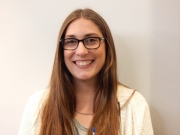Posted on March 03, 2015
Source: Natalie Flath

Hello! I’m Natalie and as a graduate student in public health, my goal is to harness the power of epidemiology to transform the trajectory of health disparities.
At previous Generation Tomorrow lecture meetings, we have openly chatted about dental dams and slippery silicone lube as a cohort of students. After explanation and giggles, we felt enthusiastic about our outreach sites and sharing our new prevention knowledge. It was all fun and games until reality hit and we started testing people for HIV, as I do on "The Block" in my field assignment at Sisters Together and Reaching (STAR). When I first started testing on The Block, I thought that I would be testing dancers. I was surprised to find that most of the people who want testing are older men, who report paying for sex.
The first guy that I ever tested for HIV was so kind and gentle, but he was not interested in an HIV test at all. I wanted him to care more, but my eagerness to roll out my safe sex knowledge was overturned when I realized why he didn't care. He was in his early twenties, carrying a bag, and needed to make a quick phone call because it was freezing outside and he had no home. He wasn't worried about the results of an HIV test; he was worried about shelter. This challenged my assumption that information would be what everyone would want.
I care about HIV because it brings light to the drivers of health disparities - not only about access to services or the affordability of them, but the structural determinants that facilitate the disparities. The public health challenge of HIV exposes the realities of social injustice and inequalities in society. At GT, we get the opportunity to apply what we are learning in the classroom to the context of real life and vice versa.